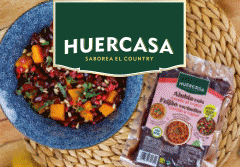Pozo Sur is applying hand pollination to 5 hectares of watermelons to ensure top quality volumes in early cycle
Being at the top of a sector entails not resting on the laurels of the successes already reached. It demands greater dynamism, a more open mind and a major investment effort to get ahead of the others. Juan López, manager of Pozo Sur, has this clear in his own mind and over the past five years the company has become the only Spanish watermelon producer that uses hand pollination in macro-tunnels, a meticulous and expensive technique that is used in Korea and Japan. In order to discover the system first-hand, we visited the farm where, every morning, a team of 20 workers from the company that has specialised in hand pollination gets to work. An area of 5 hectares where the peak of activity is concentrated in just “2 or 3 hours, the optimum period of time that the flower has to be pollinated.”
At a glance it is as simple as taking a flower and rubbing it against another one to pass its pollen on and fertilise it, but which ones are the ideal ones? What time is best? All of this requires a specific training in flowering, and we are at “the best training centre in the language of plants.” A space in which Pozo Sur ensures the success of 90% of the pollination and that allows it to obtain very high quality early fruit.
2019 campaign
This year, the company from Murcia continues with its production reduction strategy (they will drop from 62 million kg in 2018 to 55) to adapt to the needs of a “mature” market.
As a new development, its ecological farms are coming into production, 36 hectares that will increase to 100 within a maximum period of 6 years to serve its conventional produce clients, who are also demanding bio produce.
Another new development is the investment made in machinery, with a disbursement of one million euros to start up 3 calibrators with 3 new working lines to which 14 palletisers are added, as well as improvements on the previous lines, among other aspects.
Scale by ‘steps’
Pozo Sur’s quality records reveal its commitment to prioritise quality even more. From 2006 to 2019, the average increase in Brix has been 2.3 points, going from 9.1 to 11.4, on average, thanks to its variety renewal strategy with plantations that Juan López calls “by steps,” that is to say, choosing each variety in the area and on the dates that are best for it. “Each one has its cycle that is very clear, and it is important to know it and carry out a strict control.”





















